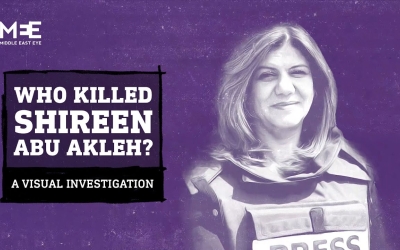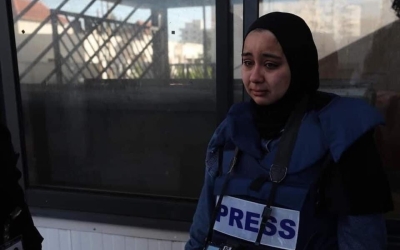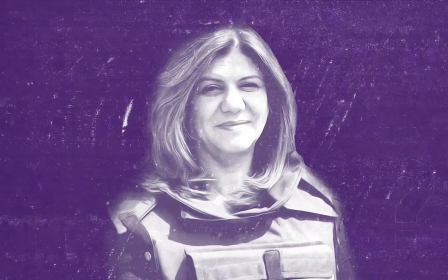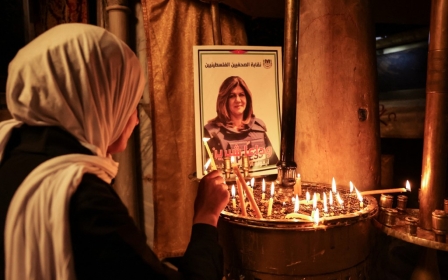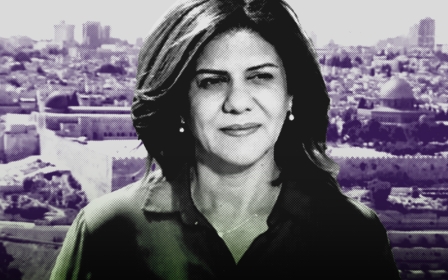Shireen Abu Akleh: State memorial service held for slain journalist
The body of slain Palestinian journalist Shireen Abu Akleh was carried to the headquarters of the Palestinian Authority (PA) presidency in Ramallah on Thursday morning for a full state memorial, before it arrived in her birthplace in Jerusalem.
The veteran reporter was fatally shot in the head by Israeli troops early on Wednesday while she was covering an army raid in the city of Jenin.
In a speech during the ceremony, Palestinian Authority (PA) President Mahmoud Abbas said that Israeli authorities were "fully responsible" for the killing.
Palestinians held a memorial service in the West Bank's city of Ramallah for journalist Shireen Abu Akleh who was killed while covering an Israeli raid in the West Bank, but have rejected US-led calls for a joint investigation into her death. pic.twitter.com/DYkxKYP7Dx
— Middle East Eye (@MiddleEastEye) May 12, 2022
New MEE newsletter: Jerusalem Dispatch
Sign up to get the latest insights and analysis on Israel-Palestine, alongside Turkey Unpacked and other MEE newsletters
"We rejected the joint investigation with the Israeli occupation authorities because they committed the crime and because we don't trust them," Abbas said during the ceremony.
He added that the PA "will go immediately to the International Criminal Court in order to track down the criminals".
Body of veteran Palestinian journalist Shireen Abu Akleh arrives in front of St. Louis French Hospital in Jerusalem.
— Middle East Eye (@MiddleEastEye) May 12, 2022
Abu Akleh was fatally shot by Israeli forces while she was covering an Israeli army raid on the Jenin refugee camp. pic.twitter.com/gc7YsaHhFZ
Earlier, Abu Akleh's body was carried from the Istishari Arab Hospital to the Muqataa - a compound housing government buildings - where national figures and politicians attended the memorial.
As Abu Akleh’s coffin was taken out of the presidential compound to the drumbeat of a marching band, crowds chanted slogans demanding an end to Palestinian security co-operation with Israel.
Hundreds of people gathered to say their final goodbyes after Abu Akleh's body's arrived in her hometown of Jerusalem, where she will be laid to rest in Mount Zion Cemetery in the Old City on Friday, beside the graves of her parents.
Meanwhile, Israeli forces intercepted the procession while it was passing through the Qalandia military checkpoint north of Jerusalem. Israeli soldiers stopped the procession and detained the senior Fatah official Shadi Mutwer.
When the coffin arrived at the Farnsawy Hospital in the Sheikh Jarrah neighborhood of Jerusalem in the afternoon, hundreds gathered to bid farewell to Abu Akleh, raising Palestinian flags. Israeli forces stormed the hospital and confiscated some flags, before the mourners forced them out.
'Crime against all Palestinian women'
Speaking to Middle East Eye from the Ramallah memorial service, Palestinian politician and activist Hanan Ashrawi said Abu Akleh’s killing constitutes “clear evidence of the methods, mindset and practices of the occupation, which resorts to assasinations with cold blood, deliberate killing, and silencing voices of truth.”
“Abu Akleh’s killing is a crime as big as the occupation itself,” she added.
'While the killing is an attempt to kill a palestinian voice, Shireen’s voice, in her death, is now even louder,'
- Hanan Ashrawi, Palestinian politician
“While the killing is an attempt to kill a Palestinian voice, Shireen’s voice is - in her death - now even louder.”
Ashrawi, the former minister and executive member of the Palestinian Liberation Organisation (PLO), said she did not expect much from the international community.
“We are not white people with blue eyes like the Ukranians. The international community reacted quickly after the Ukraine invasion, but it keeps forgetting that the Palestinian people have been living unjust occupation for 74 years.”
Meanwhile, Amal Hamad, the Palestinian minister of women’s affairs, decried the killing of Abu Akleh as a “crime against all Palestinian women.”
“Shireen was an icon for all Palestinian women. She was a legend. She was targeted because she reported the truth and because she is a prominent female reporter,” Hamad told MEE from the Ramallah ceremony.
In a rare event, Abu Akleh’s body was carried on Wednesday across three Palestinian cities, where thousands of mourners joined the procession to show their respects.
The marchers set off from Ibn Sina Hospital in Jenin north of the West Bank, where Abu Akleh had been pronounced dead, passing through the Jenin refugee camp and the spot where she was gunned down.
She was then taken to a small monastery in the city, where a priest said a prayer and church bells rang in memory of Abu Akleh, who was from a Christian family from Bethlehem.
Jenin residents, journalists, and resistance fighters from different Palestinian factions participated.
In the afternoon, her corpse was taken to Nablus, where forensic tests were conducted at al-Najah Hospital, and a military funeral parade escorted her body, draped in a Palestinian flag, through the city.
Abu Akleh was then transferred to Al Jazeera's office in Ramallah, where prayers were held and her colleagues bid her farewell.
'The martyr of Palestine'
At the same time, Palestinian journalists held vigils and memorials from Gaza to Jerusalem and Haifa, as general strikes were held across the territories.
Father Abdullah Yulio, parish priest of the Melkite Greek Catholic church in Ramallah, said Abu Akleh was “the martyr of Palestine, Jerusalem, the Arab and Islamic world.”
“She taught us again that nations are built with the blood of martyrs. So no matter how long the night is, we can see the dawn coming, God willing,” he said.
The Palestinian culture minister, Atef Abu Saif, urged journalists and writers not to be deterred by the killing of Abu Akleh.
“It is part of Israel’s targeting of Palestinian journalists, writers and artists since the Nakba, because the occupation does not want the truth to be told. But we should not be deterred by this crime.”
This is a developing story
Middle East Eye delivers independent and unrivalled coverage and analysis of the Middle East, North Africa and beyond. To learn more about republishing this content and the associated fees, please fill out this form. More about MEE can be found here.


